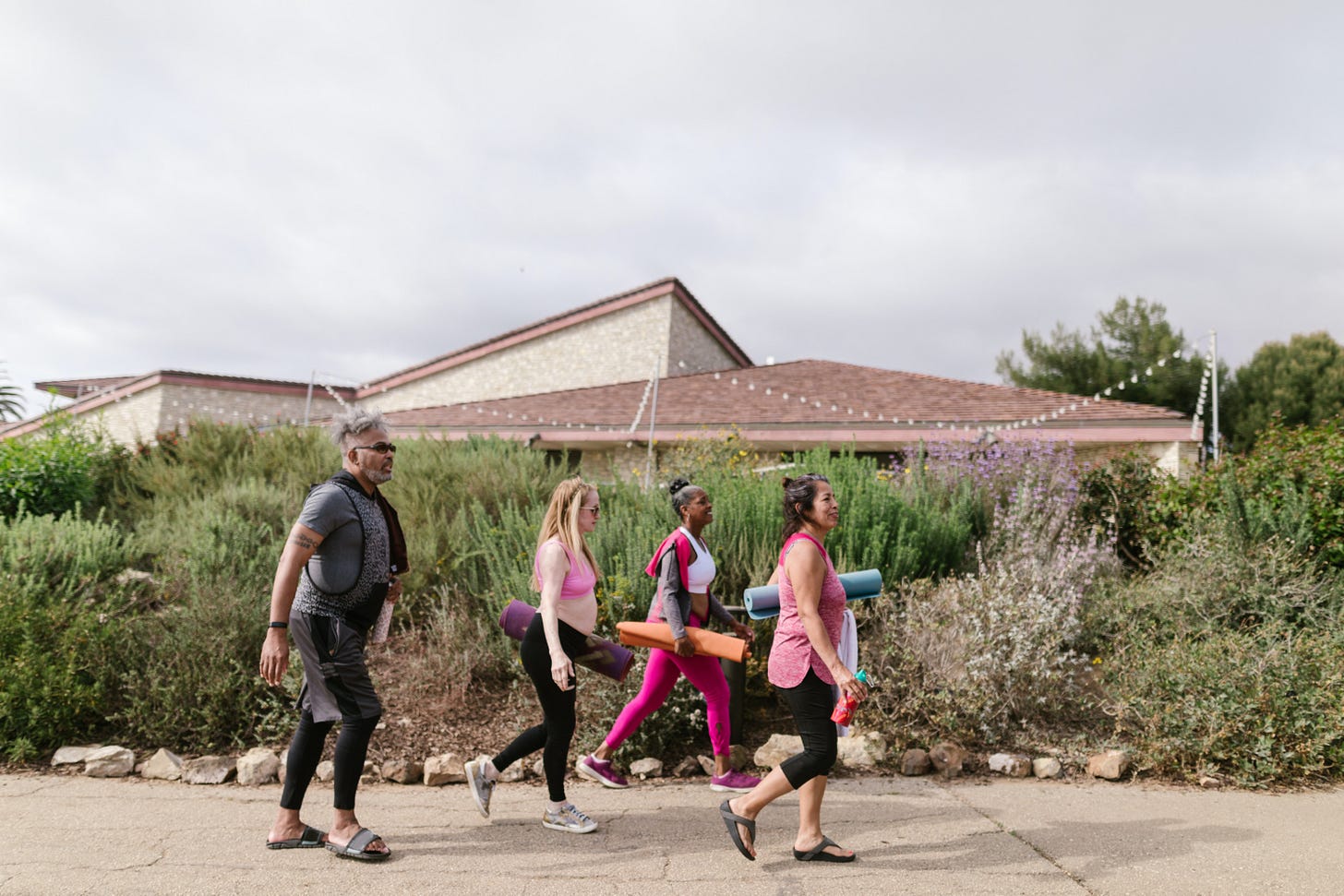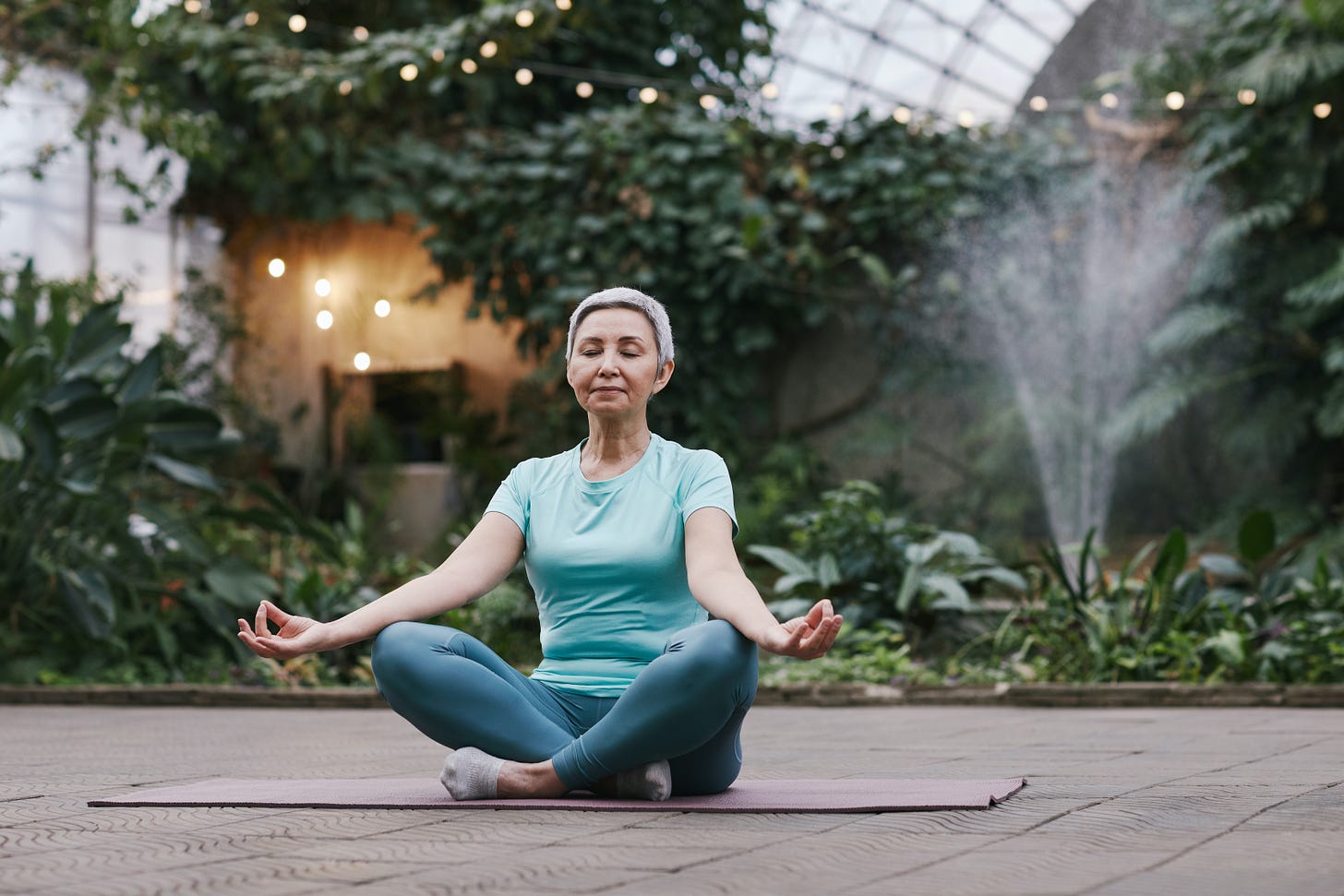Aging well is something we all aspire to achieve. When we reach our 50s, maintaining an active and healthy lifestyle can be the golden ticket to a fuller, more vibrant life. While aging is inevitable, feeling old isn’t doesn’t necessarily have to follow suit. I thought that I’d share a list that I compiled and use to remind me that wellness as we grow older is a process and implementing some or all of these various methods can cultivate a mindset of vitality and energy.
1. Embrace Regular Exercise
a. Aerobic Activities:
Cardiovascular fitness is crucial. Engage in activities like brisk walking, swimming, or cycling. Aim for at least 150 minutes of moderate-intensity exercise or 75 minutes of vigorous exercise weekly.
b. Strength Training:
Muscle mass diminishes as we age, making strength training indispensable. It enhances bone density and muscle mass, reduces the risk of osteoporosis, and improves balance and coordination.
c. Flexibility and Balance:
Yoga and tai chi enhance flexibility, balance, and proprioception, essential components for preventing falls and maintaining mobility.
2. Adopt a Nutrient-Dense Diet
Eating nutrient-rich foods like fruits, vegetables, lean proteins, and healthy fats is paramount. Adequate protein is vital for muscle preservation, while calcium and vitamin D are essential for bone health. As we age, our bodies undergo various changes, including reduced muscle mass, bone density, and metabolic rate, while the need for certain nutrients increases. A diet rich in nutrients also helps in mitigating the risks of chronic diseases such as diabetes, hypertension, and osteoporosis and aids in maintaining optimal body weight, cognitive function, and immune system strength. Consider consulting a nutritionist to tailor a diet specific to your needs.
3. Prioritize Mental Health and Cognitive Function
a. Mindfulness and Meditation:
Mindfulness and meditation are paramount for older adults as they offer a plethora of benefits encompassing mental, emotional, and physical well-being. As we age, we often encounter a variety of stressors including health issues, loss of loved ones, or reduced mobility, which can impact mental health and quality of life significantly. Mindfulness and meditation can be powerful tools in navigating these challenges, reducing stress, anxiety, and depression symptoms by fostering a heightened sense of self-awareness and promoting relaxation. Regular practice can enhance cognitive function, improving attention, memory, and problem-solving skills, which can be particularly beneficial in combating age-related cognitive decline. The integration of mindfulness and meditation into daily routines can, therefore, serve as a cornerstone for achieving a balanced and harmonious life in older age.
b. Cognitive Exercises:
Practicing cognitive exercises is especially important for older adults as it helps maintain and enhance cognitive function, combating the natural decline associated with aging. Engaging in activities that challenge the brain, such as puzzles, reading, learning new skills, or playing strategy games, stimulates neural activity and promotes the formation of new neural connections, crucial for maintaining mental agility. Regular cognitive stimulation can help in preventing or delaying the onset of neurodegenerative conditions like Alzheimer’s disease and other forms of dementia. Furthermore, cognitive exercises contribute to improved memory, attention, problem-solving, and decision-making skills, enabling older adults to maintain their independence and quality of life.
4. Stay Socially Connected
Maintaining social connections is pivotal for older adults, impacting our overall well-being and quality of life profoundly. Social engagement acts as a buffer against isolation and loneliness, prevalent concerns for our age group that are associated with a plethora of mental health issues including depression and anxiety. Beyond mental health, the benefits of social connectivity extend to physical well-being. Regular interaction with friends, family, or community members can result in lower blood pressure and reduced risk of cardiovascular problems, thus potentially increasing longevity. A supportive social network can also encourage older adults to maintain healthy lifestyle habits, like regular exercise and a balanced diet, which are crucial for managing chronic conditions and preventing health decline.
5. Regular Health Check-ups
For older adults, securing regular health check-ups is imperative as a proactive approach to maintaining well-being and longevity. As the body ages, it becomes more susceptible to chronic conditions like hypertension, diabetes, and heart disease, and early detection through regular screenings can be pivotal in managing these conditions effectively. Regular check-ups allow for timely identification of potential health issues, enabling early intervention and preventing the progression of undiagnosed ailments. These check-ups also provide an opportunity for healthcare providers to assess the risk factors for various conditions and to advise on lifestyle modifications and preventative measures that will assist older adults in making informed decisions about their health.
6. Adequate Sleep and Rest
Acquiring adequate sleep and rest is fundamental for older adults, as it profoundly impacts our overall well-being and quality of life. Sleep is a restorative process crucial for the maintenance and repair of physiological systems, and sleep disruptions can lead to a range of health issues, including impaired cognitive function, weakened immune system, and increased risk of chronic conditions such as heart disease and diabetes. For older adults, who may be more susceptible to such health issues, maintaining healthy sleep patterns is especially critical. Sufficient rest contributes to enhanced mood, better mental clarity, improved emotional balance, and increased energy levels, enabling older adults to engage more fully in daily activities and maintain a higher quality of life. Aim for 7 to 9 hours of sleep per night and consider adopting a regular sleep schedule and creating a restful sleeping environment.

7. Stay Hydrated
Staying adequately hydrated is of paramount importance for older adults as dehydration can quickly lead to numerous health complications. With age, the body's ability to conserve water is reduced, the sense of thirst diminishes, and more significant amounts of fluid are lost through the kidneys. These changes make older adults more prone to dehydration, which, if not addressed, can lead to urinary tract infections, kidney stones, and, in severe cases, kidney failure. Moreover, adequate hydration supports cognitive function, maintains electrolyte balance, aids digestion, and keeps the skin healthy, all of which are crucial for maintaining the overall well-being of older adults.
8. Leverage Technology
Leveraging technology is increasingly significant for older adults as it holds the potential to significantly enhance their quality of life. In today’s interconnected world, technology can mitigate feelings of isolation by offering diverse means of communication, enabling older adults to maintain relationships and establish new connections. It can provide access to a wealth of information and services, from health advice to grocery deliveries, making daily life more convenient and informed. Additionally, health and fitness apps can assist in monitoring and managing health and wellness, encouraging a more proactive approach to well-being. Moreover, technology can offer cognitive stimulation through various applications and games designed to challenge the mind, thus contributing to cognitive resilience.

9. Explore New Hobbies and Interests
Exploring new hobbies and interests is essential for older adults as it significantly enriches their lives by providing a sense of purpose and fulfillment. Engaging in new activities stimulates mental faculties, promoting cognitive flexibility and resilience, essential components for combating age-related cognitive decline. It provides opportunities for social engagement, reducing feelings of isolation and loneliness, and contributing to emotional well-being.

10. Maintain a Positive Outlook
Maintaining a positive outlook is crucial for older adults as it fundamentally shapes the experience of aging. A positive perspective can act as a buffer against stress, anxiety, and depression, which are often prevalent in older age due to various life transitions and health concerns. A positive mindset is associated with better coping mechanisms, improved problem-solving abilities, and enhanced resilience in the face of challenges, enabling older adults to navigate the complexities of aging more effectively. It has also been linked to better physical health, including lower incidence of chronic conditions, better immune function, and even longevity.
Embarking on the journey of the 50s and beyond is like discovering a new horizon of possibilities. Staying active is not just about physical movement; it’s about embracing a holistic approach to health, involving mind, body, and soul. By combining regular exercise with balanced nutrition, adequate sleep, cognitive stimulation, social interaction, and a positive outlook, one can navigate the aging process with grace, vitality, and joy. Cultivating such a lifestyle enables not just longevity but also a higher quality of life, filled with energy, happiness, and fulfillment. It’s never too late to adopt a healthier, more active lifestyle, paving the way for a brighter, more vibrant future regardless of the number of candles on your birthday cake.












